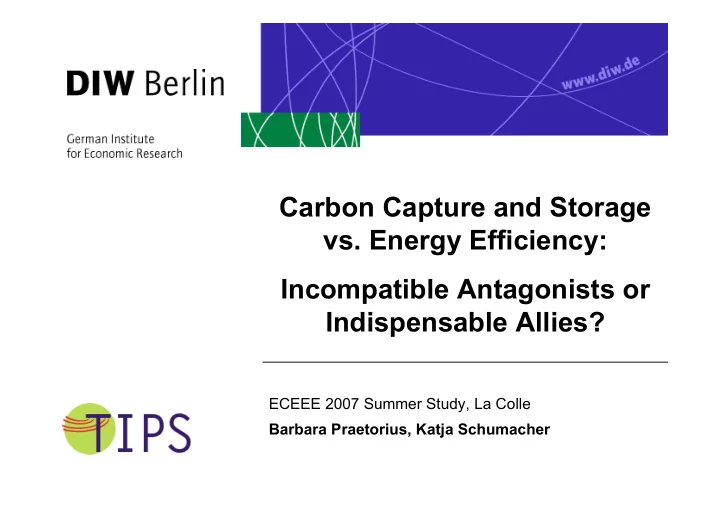

Carbon Capture and Storage vs. Energy Efficiency: Incompatible Antagonists or Indispensable Allies? ECEEE 2007 Summer Study, La Colle Barbara Praetorius, Katja Schumacher
Agenda – Introduction – CCS issues – Activities – Mitigation scenarios – Conclusions Praetorius, Schumacher ECEEE 2007
Introduction Coal and CCS in GERMANY – Major domestic energy resource and power generation input – Climate change and the low-emissions coal power station What is Carbon Capture and Storage? Not a new technology (EOR; EGR) For power sector, 3 technologies under development: – Pre combustion ( RWE, 450 MW Plant, 2014 ) – Oxyfuel ( Vattenfall, 30 MW pilot plant, 2008 ) – Post combustion ( Alstom/American Electric Power, 2011 ) Praetorius, Schumacher ECEEE 2007
CCS process steps Source: CO2CRC. http://www.co2crc.com.au Praetorius, Schumacher ECEEE 2007
Issues and challenges Economics – Higher up-front investment – Additional energy input (“energy penalty”) – Economical at a CO 2 price of > 30 EUR/t Availability and timing – Mitigation option for large point sources – IGCC most promising (by 2020) with economic advantages compared to retrofit, oxyfuel and NGCC – Bridging technology: Theoretical storage capacity of 80-150 yrs (in Germany) Environmental risks – Leakage over time – Geological issues (acid & other) Praetorius, Schumacher ECEEE 2007
Issues and challenges (2) Resulting issues and challenges – Further R&D on open questions and risks – Liability and other regulations (national, cross-border) – Policy framework (carbon regime, level and intensity of R&D support…) – Public acceptance Praetorius, Schumacher ECEEE 2007
CCS activities in Germany and abroad Agenda setting phase , no elaborated policy yet – R&D networks (COORETEC, GEOTECHNOLOGIES) – European level: ZEP technology platform (2005) – International level: CSLF (2003) – NGO positions formed (2005-2006) Actors and interests – Early drivers: Oil & gas industry, research organisations, some ministries – Electricity and power plant industry increasingly involved – NGO / Ministry for Environment BMU / Federal environmental office UBA rather critical, but – No fierce opposition Praetorius, Schumacher ECEEE 2007
Interface of energy efficiency and CCS – Decrease in conversion efficiency vs. efficiency – Competition for R&D funding (also with renewables) – Or: Complementary approaches within a mix of policies and measures? Praetorius, Schumacher ECEEE 2007
Potential impact on future electricity system: Mitigation scenarios – Wide range of cost estimates for CCS – Studies including CCS as a mitigation option conclude: • Lower economic costs when CCS is included • High uncertainties on costs • Time of commercial availability matters – Most studies are of bottom-up type and include detailed technology information – They lack interaction with rest of economy, take energy demand and macroeconomic development as given – Macroeconomic (top-down) models lack technology detail – Attempt to combine features from both models Praetorius, Schumacher ECEEE 2007
Analysis with SGM Germany – SGM Germany: computable general equilibrium model for Germany – Embodies technology detail for electricity sector (NGCC, IGCC, and coal power with and without CCS, renewables) – Economy-wide framework: allows interaction of sectors – Used to analyze economic, energy and environmental effects of policy measures • Output adjustment • Structural change • Demand and supply efficiency changes • Shifts in technologies in electricity sector Praetorius, Schumacher ECEEE 2007
Simulated economy wide emissions reductions, Germany 2020 60 2020 efficiency fuel switch CCS 50 df carbon price ( � per tCO 2 ) 40 30 20 10 0 0% 2% 4% 6% 8% 10% 12% 14% 16% 18% 20% reduction in CO 2 emissions as fraction of baseline Praetorius, Schumacher ECEEE 2007
Simulated economy wide emissions reductions, Germany 2040 60 2040 efficiency fuel switch CCS 50 carbon price ( � per tCO 2 ) 40 30 20 10 0 0% 2% 4% 6% 8% 10% 12% 14% 16% 18% 20% reduction in CO 2 emissions as fraction of baseline Praetorius, Schumacher ECEEE 2007
Electricity sector decomposition over time (baseline) 60 Generation efficiency Output Fuel structure Change in Emissions (million tCO 2 ) Sum 20 1995 2000 2005 2010 2015 2020 2025 2030 2035 2040 2045 2050 -20 -60 Praetorius, Schumacher ECEEE 2007
Electricity sector decomposition over time (step wise CO 2 policy) 40 0 1995 2000 2005 2010 2015 2020 2025 2030 2035 2040 2045 2050 Change in Emissions (million tCO 2 ) -40 CCS -80 Generation efficiency Fuel structure Output -120 Sum -160 -200 Praetorius, Schumacher ECEEE 2007
Conclusions - It is likely that CCS will come (retrofit unlikely though) - Stringent and reliable CO 2 policy is important - Given uncertainties and storage constraint CCS may serve as bridging technology - Timing matters - CCS no magic bullet, unlike perhaps energy efficiency - CCS and energy efficiency can both contribute to emissions reduction, given high enough CO 2 price - CCS more important in the relation to renewable energy and nuclear power Praetorius, Schumacher ECEEE 2007
Thank you Your comments are welcome! Praetorius, Schumacher ECEEE 2007
Praetorius, Schumacher ECEEE 2007
CO 2 capture process: Different options Praetorius, Schumacher ECEEE 2007
SGM Results: Baseline electricity generation TWh 700 600 wind subsidized wind 500 nuclear NGCC 400 IGCC 300 advanced coal (PCA) 200 coal (PC) 100 gas oil hydro&other ren 0 1995 2000 2005 2010 2015 2020 2025 2030 2035 2040 2045 2050 Praetorius, Schumacher ECEEE 2007
Electricity sector results – stepwise increase of CO2 price, without CCS TWh 700 Baseline 600 Policy scenario wind 500 nuclear subsidized wind NGCCccs 400 NGCC 300 IGCCccs IGCC advanced coal 200 PCAccs coal (PC) (PCA) 100 gas oil hydro & other ren 0 1995 2000 2005 2010 2015 2020 2025 2030 2035 2040 2045 2050 Praetorius, Schumacher ECEEE 2007
Electricity sector results – stepwise increase of CO2 price, with CCS TWh 700 Baseline 600 Policy scenario wind 500 nuclear subsidized wind NGCCccs 400 NGCC 300 IGCCccs IGCC 200 advanced coal PCAccs coal (PC) (PCA) 100 gas oil hydro & other ren 0 1995 2000 2005 2010 2015 2020 2025 2030 2035 2040 2045 2050 Praetorius, Schumacher ECEEE 2007
Recommend
More recommend